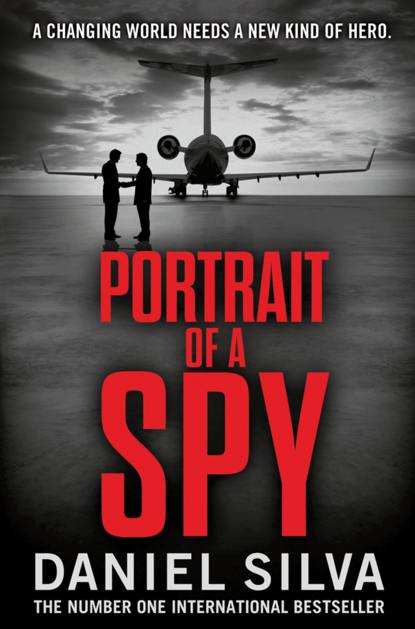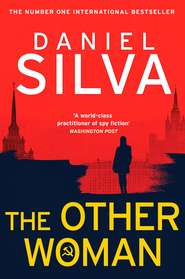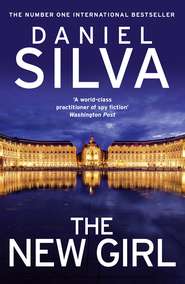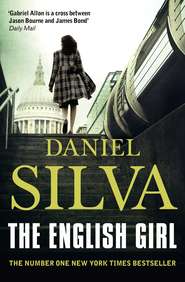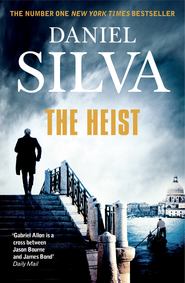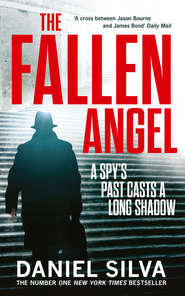По всем вопросам обращайтесь на: info@litportal.ru
(©) 2003-2024.
✖
Portrait of a Spy
Настройки чтения
Размер шрифта
Высота строк
Поля
“I’m sorry, Gabriel. I should have said something, but Julian was adamant. He knew your first instinct would be to say no.”
“He could sell the gallery to Oliver Dimbleby in a heartbeat and retire to an island in the Caribbean.”
“Have you considered what that might mean for us? Do you really want to clean pictures for Oliver Dimbleby? Or Giles Pittaway? Or were you thinking you could scrape up a bit of freelance work from the Tate or the National Gallery?”
“It sounds as if you and Julian have it all worked out.”
“We do.”
“Then perhaps you should become Julian’s partner.”
“Only if you clean pictures for me.”
Gabriel could see that Chiara was serious. “Running a gallery isn’t all about attending glamorous auctions and having long lunches in fancy restaurants in Jermyn Street. And it’s not something that should be considered a hobby.”
“Thank you for dismissing me as a dilettante.”
“That’s not what I meant, and you know it.”
“You’re not the only one who’s retired from the Office, Gabriel. I am, too. But unlike you, I don’t have damaged Old Masters to occupy my time.”
“So you want to become an art dealer? You’ll spend your days rummaging through piles of mediocre paintings, looking for another lost Titian. And chances are you’ll never find one.”
“It doesn’t sound that bad to me.” Chiara looked around the street. “And it means we could live here.”
“I thought you liked Cornwall.”
“I adore it,” she said. “Just not in winter.”
Gabriel lapsed into silence. He had been bracing himself for a conversation like this for some time. “I thought we were going to have a baby,” he said.
“So did I,” Chiara said. “But I’m beginning to think it might not be possible. Nothing I try seems to be working.”
There was a note of resignation in her voice that Gabriel had never heard before. “So we’ll keep trying,” he said.
“I just don’t want you to be disappointed. It was the miscarriage. It’s going to make it much harder for me to ever conceive again. Who knows? A change of scenery might help. Just think about it,” she said, squeezing his hand. “That’s all I’m saying, darling. We might actually enjoy living here.”
In the broad Italianate piazza of the Covent Garden Market, a street comedian was arranging a pair of unsuspecting German tourists into a pose suggestive of sexual intimacy. Chiara leaned against a pillar to watch the performance while Gabriel fell into an undignified sulk, his eyes scanning the large crowd gathered in the square and atop the balcony bar of the Punch and Judy. He was not angry with Chiara but with himself. For years, their relationship had revolved around Gabriel and his work. It had never occurred to him that Chiara might have career aspirations of her own. If they were a normal couple, he might have considered the opportunity. But they were not a normal couple. They were former operatives of one of the world’s most celebrated intelligence services. And they had a past that was far too bloody to lead so public a life.
As they headed into the soaring glass arcade of the market, any residual tension from their quarrel quickly dissipated. Even Gabriel, who detested shopping in all its forms, took pleasure in roaming the colorful shops and stalls with Chiara at his side. Intoxicated by the smell of her hair, he imagined the afternoon that lay ahead—a quiet lunch followed by a pleasant walk back to their hotel. There, in the cool shadows of their room, Gabriel would slowly undress Chiara and make love to her in the enormous bed. For a moment, it was almost possible for Gabriel to imagine his past had been erased, that his exploits were mere fables gathering dust in the file rooms of King Saul Boulevard. Only the watchfulness remained—the instinctive, gnawing vigilance that made it impossible for him to ever feel completely at peace in public. It forced him to make a mental charcoal sketch of every passing face in the crowded market. And in Wellington Street, as they were approaching the restaurant, it caused him to freeze in his tracks. Chiara tugged playfully at his arm. Then she stared directly into his eyes and realized something was wrong.
“You look as though you just saw a ghost.”
“Not a ghost. A dead man.”
“Where?”
Gabriel nodded toward a figure in a gray woolen overcoat.
“Right there.”
Chapter 5
Covent Garden, London
THERE ARE TELLTALE INDICATORS COMMON to suicide bombers. Lips can move involuntarily as final prayers are recited. Eyes can have a glassy thousand-yard stare. And the face can sometimes appear unnaturally pale, evidence that an unkempt beard has been hastily removed in preparation for a mission. The dead man exhibited none of these traits. His lips were pursed. His eyes were clear and focused. And his face was evenly colored. He had been shaving regularly for a long time.
What set him apart was the thin tributary of sweat leaking from his left sideburn. Why was he perspiring on a crisp autumn afternoon? If he was warm, why were his hands buried in the pockets of his woolen overcoat? And why was the overcoat—a size too large, in Gabriel’s opinion—still tightly buttoned? And then there was his walk. Even a physically fit man in his late twenties will have difficulty feigning a normal gait when saddled with fifty pounds of high explosives, nails, and ball bearings. As the dead man walked past Gabriel in Wellington Street, he appeared unusually erect, as if he were trying to compensate for the added weight around his abdomen and kidneys. The fabric of his gabardine trousers vibrated with each step, as though the joints in his hips and knees were shuddering beneath the burden of the bomb. It was possible that the perspiring young man with the oversized coat was an innocent who simply needed to do a bit of midday shopping, but Gabriel suspected otherwise. He believed the man walking a few paces ahead represented the finale of a continent-wide day of terror. First Paris, then Copenhagen, and now London.
Gabriel ordered Chiara to take shelter in the restaurant and quickly crossed to the opposite pavement. He shadowed the dead man for approximately a hundred yards, then watched as he rounded the corner into the entrance of the Covent Garden Market. There were two cafés on the eastern side of the piazza, each filled with lunchtime patrons. Standing between them in a patch of sunlight were three uniformed Metropolitan Police Service officers. None took notice of the dead man as he entered the market arcade.
Gabriel now had a decision to make. The most obvious course of action was to tell the police of his suspicions—obvious, he thought, but not necessarily optimal. In all likelihood, the police would respond to Gabriel’s approach by pulling him aside for questioning, wasting several precious seconds. Worse still, they might confront the man, a ploy that would almost certainly cause him to detonate his weapon. Although virtually every officer on the Met had been given basic instruction in counterterrorism tactics, few had the experience or firepower necessary to take down a committed jihadist bent on martyrdom. Gabriel had both, and he had acted against suicide bombers before. He glided past the three officers and slipped inside the arcade.
The dead man was now twenty yards ahead, moving at a parade-ground clip along the elevated walkway of the main hall. Gabriel reckoned he was carrying enough explosives and shrapnel to kill everyone within a seventy-five-foot radius. Doctrine dictated that Gabriel remain beyond the lethal blast zone until it was time to make his move. The environment, however, compelled him to close the distance and place himself in greater danger. A headshot from seventy-five feet was difficult under the best of circumstances, even for a gunman with the skills of Gabriel Allon. In a crowded shopping arcade, it would be next to impossible.
Gabriel felt his mobile phone vibrate softly in his coat pocket. Ignoring it, he watched as the dead man paused along the railing of the walkway to check his watch. Gabriel took note of the fact it was worn on the left wrist, which meant the detonator switch was almost certainly in the right hand. But why would a suicide bomber stop on his way to martyrdom to check the time? The most likely explanation was that he had been ordered to end his life and the lives of many innocent people at a precise moment. Gabriel suspected there might be some sort of symbolism involved. There usually was. The terrorists of al-Qaeda and its offshoots loved symbolism, especially when it involved numbers.
Gabriel was now close enough to the dead man to see his eyes. They were clear and focused, an encouraging sign. It meant he was still thinking about his mission rather than the carnal delights awaiting him in Paradise. When he started dreaming of the perfumed, dark-eyed houris, it would show on his face. Then Gabriel would have a choice to make. For now, he needed the dead man to stay in this world a little longer.
The dead man made another check of the time. Gabriel glanced quickly at his own watch: 2:34. He ran the numerals through the database of his memory, looking for any connection. He added them, subtracted them, multiplied them, reversed them, and rearranged their order. Then he thought about the two previous attacks. The first occurred at 11:46, the second at 12:03. It was possible the times were representative of years on the Gregorian calendar, but Gabriel could find no connection.
He mentally erased the hours of the attacks and focused only on the minutes. Forty-six minutes past, three minutes past. Then he understood. The times were as familiar to him as the brushstrokes of Titian. Forty-six minutes past, three minutes past. They were two of the most famous moments in the history of terrorism—the exact times at which the two hijacked airliners struck the World Trade Center on 9/11. American Airlines Flight 11 crashed into the North Tower at 8:46 a.m. United Airlines Flight 175 struck the South Tower at 9:03 a.m. The third plane to successfully hit its target that morning was American Airlines Flight 77, which was flown into the western side of the Pentagon. The local time had been 9:37 a.m., 2:37 p.m. in London.
Gabriel checked his digital watch. It was now a few seconds past 2:35. Looking up, he saw the man in the gray overcoat was once again moving at a brisk pace, hands in his pockets, seemingly oblivious to the people around him. As Gabriel followed, his mobile began to vibrate again. This time, he answered and heard the voice of Chiara. He told her that a suicide bomber was about to detonate himself in Covent Garden and instructed her to make contact with MI5. Then he slipped the phone back into his pocket and began closing the distance between himself and the target. He feared that many innocent people were about to die. And he wondered whether there was anything he could do to stop it.
Chapter 6
Covent Garden, London
THERE WAS ONE OTHER POSSIBILITY, of course—the possibility that the man walking several paces ahead of Gabriel had nothing beneath his coat but a few extra pounds of body fat. Inevitably, Gabriel recalled the case of Jean Charles de Menezes, the Brazilian-born electrician who was shot to death by British police in London’s Stockwell tube station after being mistaken for a wanted Islamic militant. British prosecutors declined to bring charges against the officers involved in the killing, a decision that provoked outrage among human rights activists and civil libertarians around the world. Gabriel knew that, under similar circumstances, he could expect no such leniency. It meant he would have to be certain before acting. He was confident of one thing. He believed the bomber, like a painter, would sign his name before pressing his detonator switch. He would want his victims to know that their imminent deaths were not without purpose, that they were being sacrificed in the name of the sacred jihad and in the name of Allah.
For the moment, though, Gabriel had no choice but to follow the man and wait. Slowly, carefully, he closed the gap, making small adjustments in his own course to maintain an unobstructed firing lane. His eyes were focused on the lower portion of the man’s skull. A few centimeters beneath it was the brain stem, essential for controlling the motor and sensory systems of the rest of the body. Destroy the brain stem with several rounds of ammunition, and the bomber would lack the means to press his detonator button. Miss the brain stem, and it was possible the martyr could carry out his mission with a dying twitch. Gabriel was one of the few men in the world who had actually killed a terrorist before he could carry out his attack. He knew the difference between success and failure would come down to a fraction of a second. Success meant only one would die. Failure would result in the deaths of scores of innocent people, perhaps even Gabriel himself.
The dead man passed through the doorway leading to the piazza. It was far more crowded now. A cellist was playing a suite by Bach. A Jimi Hendrix impersonator was grappling with an amplified electric guitar. A well-dressed man standing atop a wooden crate was shouting something about God and the Iraq War. The dead man headed directly toward the center of the square, where the comedian’s performance had sunk to new depths of depravity, much to the delight of the large crowd of spectators. Using techniques learned in his youth, Gabriel mentally silenced the noises around him one by one, starting with the faint strains of the Bach suite and ending with the uproarious laughter of the crowd. Then he glanced one last time at his wristwatch and waited for the dead man to sign his name.
It was 2:36. The dead man had reached the outer edge of the large crowd. He paused for a few seconds, as if searching for a weak point to make his entry, then shouldered his way between two startled women. Gabriel entered at a different spot several yards to the man’s right, slipping virtually unnoticed through a family of American tourists. The crowd was four-deep in most places and tightly packed, which presented Gabriel with yet another dilemma. The ideal ammunition for a situation like this was a hollow-point round, which would inflict greater tissue damage on the target and substantially reduce the risk of collateral casualties due to over-penetration. But Gabriel’s Beretta pistol was loaded with ordinary 9mm Parabellum rounds. As a result, he would have to position himself to fire at an extreme downward trajectory. Otherwise, there was a high probability he might inadvertently take innocent life in an attempt to save it.
The dead man had breached the inner wall of the crowd and was now headed directly toward the street comedian. The eyes had taken on the glassy thousand-yard stare. The lips were moving. Final prayers . . . The street comedian wrongly assumed the dead man wished to take part in the performance. Smiling, he took two steps toward him but froze when he saw the hands emerge from the pockets of the overcoat. The left was slightly open. The right was bunched into a fist, with the thumb cocked at a right angle. Still, Gabriel hesitated. What if there was no detonator? What if it was a pen or a cylinder of lip balm? He had to be sure. Tell me your intentions, he thought. Sign your name.
The dead man turned to face the market. The patrons looking down from the balcony of the Punch and Judy laughed nervously, as did a few of the spectators gathered in the piazza. In his mind, Gabriel silenced the laughter and froze the image. The scene appeared to him as though painted by the hand of Canaletto. The figures were stock-still; only Gabriel, the restorer, was free to move among them. He slipped through the front row of the spectators and focused his gaze on the spot at the back of the skull. Firing at a downward angle was not possible. But there was another potential solution to prevent collateral casualties: an upward line of fire would carry Gabriel’s round safely over the heads of the spectators and into the façade of the adjacent building. He pictured the maneuver in sequence—the cross-handed draw, the crouch, the shot, the advance—and waited for the dead man to sign his name.
The silence in Gabriel’s head was broken by a drunken shout from the balcony of the Punch and Judy—a command for the martyr to move out of the way and allow the performance to continue. The dead man responded by lifting his arms above his head like a long-distance runner breaking the finishing tape. On the inside of the right wrist was a thin wire leading from the detonator switch to the explosives. It was all the evidence Gabriel needed. He reached into his jacket and seized the butt of his Beretta. Then, as the dead man screamed “Allahu Akbar,” Gabriel dropped to one knee and leveled the weapon toward his target. Remarkably, the shot was clear, with no chance of secondary casualties. But as Gabriel was about to squeeze the trigger, two powerful hands pulled the gun downward, and the weight of two men drove him toward the paving stones.
At the instant he hit the ground, he heard a sound like the crack of thunder and felt a wave of scorching air wash over him. For a few seconds, Gabriel heard nothing more. Then the screaming started, a single shriek, followed by an aria of wailing. Gabriel lifted his head and saw a scene from his nightmares. It was body parts and blood. It was Baghdad on the Thames.
Chapter 7
New Scotland Yard, London





